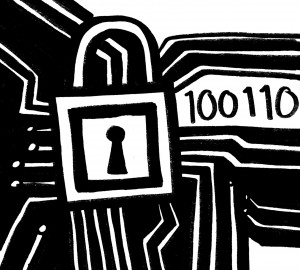In many ways, last year’s NSA leak was a tipping point in the public perception of conflict between personal privacy and national security. Sentiments against government overwatch programs had persisted for years, of course, spurred on by the Patriot Act and whispers of government wiretaps on U.S. citizens suspected of terrorism. But it wasn’t until the full implications of the Snowden files emerged that it became clear these concepts weren’t simply the hallmarks of conspiracy theorists and satirical “Simpsons” episodes.
As our lives become increasingly dependent on data, the concept that a shadowy stranger could be examining us is far more unnerving than the old wiretap theories – phone calls can only hold so much, but our phones themselves have begun to hold so much more. Revealing the NSA’s breach of privacy, the solid proof of the fact that they had sifted through our files like pages in a book, was so deeply invasive that it shifted even the staunchest proponents of antiterrorism measures into doubt.
The exact effect this would have on the function of the internet and the government’s approach to data security wasn’t immediately clear after the leak. But it may be coming to the forefront now, many months later, as both Apple and Google announced that their encryption policies on mobile devices are now designed to be impenetrable even to law enforcement.
These updates would ensure that any and all data on the device would only be releasable through a user password – the companies have reinforced that law enforcement would no longer be capable of accessing those files, even if presented with a search warrant.
Reception from law enforcement, naturally, has been negative. Their reasons are surprisingly persuasive. While nobody likes the idea of being observed under some vague definition of “national security necessity,” they might think differently if that access meant finding the location of their kidnapped child.
Cases such as theft, pedophilia, and even murder all have proven track records of being resolved through mobile device searches, and police have attested to the number of successful prosecutions involving criminals who posted selfies of themselves, their accomplices, and their stolen loot.
Putting mobile devices under encryption lockdown would put a stop to that, or at least make it massively more difficult and expensive, leading many law enforcement officials to worry that the upcoming changes will simply serve as a haven for criminal activity.
“I am a huge believer in the rule of law,” FBI Director James Comey stated when prompted by reporters last week. “What concerns me about this is companies marketing something expressly to allow people to place themselves beyond the law.”
Others have expressed the opposing view that increasing data security would be a boon for everyone involved, including the law support community. Jonathan Zdziarski, an iOS forensics expert, attested that weakening security for law enforcement would simply make systems more vulnerable to privacy leaks and attacks by cybercriminals and foreign governments.
“For the sake of privacy and overall security, the only logical solution is to make products as secure as possible, and let good detective work do the crime solving, rather than an easy button,” he said.
In any case, it looks as though the criticism will have little effect on the decisions of the tech juggernauts, as there are no laws that can prevent them from ensuring these new data policies. Once it is released, it will take a while for the effects to spread, since the new measures will only be available on the latest generation devices.
Until data encryption becomes fully pervasive, it will be hard to tell what the final effects will be. While we’ve seen more than enough of the negative results of unrestricted governmental access to data, we may be surprised by other unexplored negatives when that access is suddenly revoked.
Copeland is a member of class of 2015.





